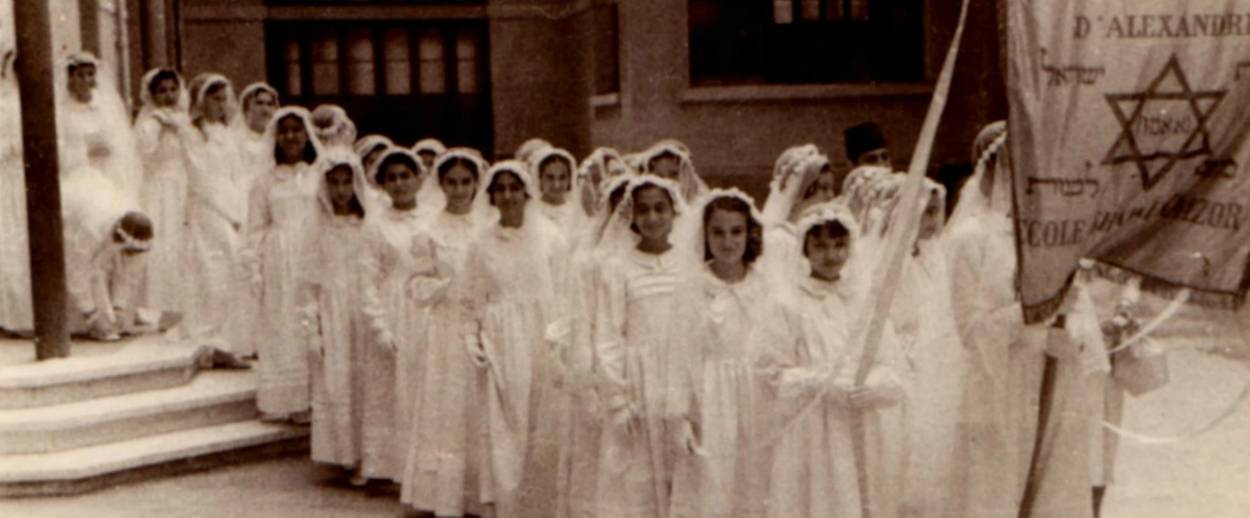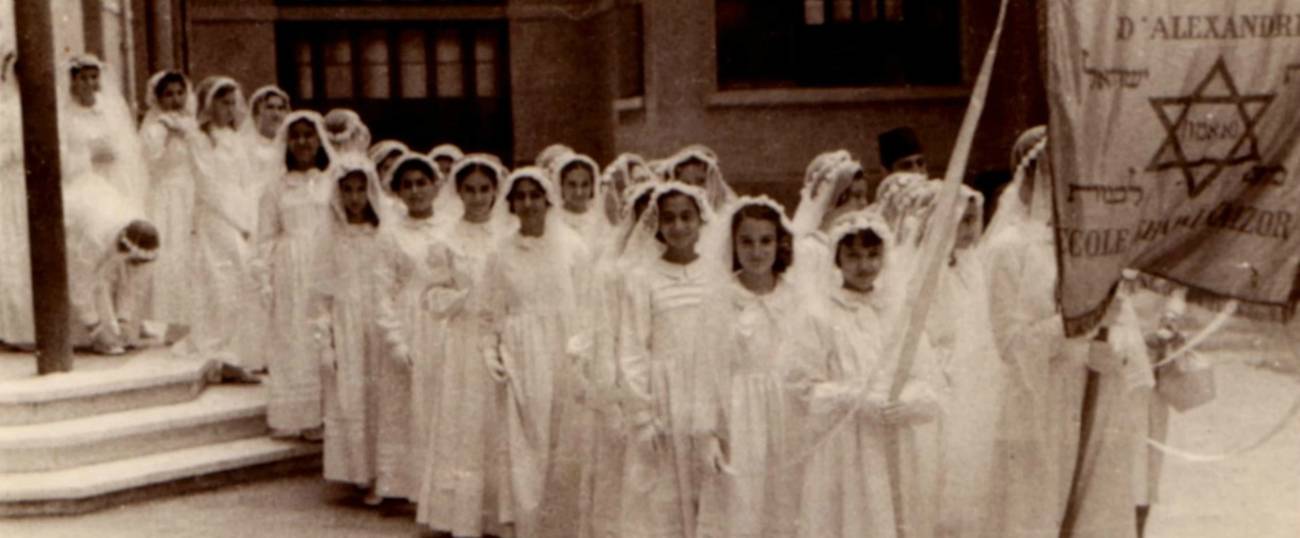There Were Once Jews Here
During the Six-Day War, some of the Arab countries at war with Israel—Egypt, Tunisia, Libya—treated their Jewish populations terribly, causing them to leave en masse




We have been hearing a lot about the war waged by multiple Arab countries against Israel 50 years ago. But there was another war waged by some of those same countries that same week that we have heard pretty much nothing about: a war against the Jews.
Even in June 1967, after two decades of threats, expulsions, and pointed hostility by Arab leaders toward their own Jewish populations, there were still some doughty Jews left in the Arab world.
Admittedly, not too many.
By the mid to late 1960s, the vast majority of Arab Jews, who once numbered 800,000, were gone from their ancestral lands. It had taken only two decades for the Arab world—a fairly congenial home for Jews for hundreds of years or more—to rid themselves of most of their Jewish populations. Some countries, such as Algeria, had seen Jews leave en masse after the country became independent from France in 1962 and there were few who remained.
But some Jewish stragglers had held on. Either out of a sense of principle that the Middle East was their home, or because they lacked the wherewithal to leave, or they thought they could tough it out, or God knows why. There they were, clustered in small communities from Cairo to Tunis.
That week in June—which sparked terrifying anti-Jewish riots, shop burnings, mass incarcerations, and even murders—would change that, eliminating any last lingering illusions these Jews may have held that they could stay put.
We know of course how multiple Arab armies who had expected to stamp out Israel were themselves crushed. It was all so humiliating, and it is understandable the region was seething.
What wasn’t—what isn’t—forgivable, even looking back 50 years later, was how residents of those countries chose to vent their rage: By turning it against the Jews in their midst, most of who were studiously apolitical and had nothing to do with the war, its outbreak or its outcome.
Even in those countries that were, as some of us like to say, “nice to the Jews”—such as Tunisia, where fairly sizable Jewish communities were left in 1967—there were terrifying demonstrations and expressions of hatred and venom. Jews from Morocco left in exodus. In countries like Libya, murderous assaults took place that prompted an emergency evacuation of hundreds of Jews.
Egypt, where I was born and spent my early childhood, engaged in especially tawdry behavior. My family had left in 1963, following tens of thousands of other Jews out of the country. We did so reluctantly: My father didn’t want to go and it took pressure from my siblings to convince him. He simply couldn’t bear the thought of life outside of Egypt.
That was the case with a lot of Egyptian Jews. While they loved Israel too, they saw themselves as Egyptian. I can still hear Dad’s cries on the boat out of Alexandria harbor: “Ragaouna Masr”—Take Us Back to Cairo.
But our little boat kept chugging along.It wouldn’t turn back. It has taken me years to realize—sort of, as I still love Egypt passionately: Lucky us.
In 1967, there were an estimated 2,500-3,000 Jews still left between Cairo and Alexandria, down from a high of 80,000 in 1948.
On that week in ’67, the Egyptian government began rounding up Jewish men, to send to jails and prison camps. By accounts of the time, as many as 400 or 500 Jews were imprisoned.
While they gallantly left girls and women alone, authorities picked up Jewish men young and old. Even the Chief Rabbi of Alexandria was arrested. Enraged about their failure to defeat the Jewish state, the Egyptians turned their wrath on Jews whose crime, as far as I can tell, was that they were living in Egypt.
Nor did the aftermath of the war lead to the prisoners’ swift release. It is true some were in jail a mere couple of weeks until some foreign embassies helped get them out. But others lingered for months, even years, as Egypt released Jewish prisoners in painful dribs and drabs.
Albert Gabbai, rabbi of the venerable Congregation Mikveh Israel in Philadelphia, was 18 and still in school in Cairo that June. He and his three older brothers and two sisters lived with their widowed mother. Their father, once a shirt-maker to King Farouk, had died years earlier and the brothers managed his clothing business along with their mom. Four other brothers had made it to America and the plan, he recalled, was to join them.
Rabbi Gabbai still remembers how the authorities first dragged his two older brothers to prison that week in June. Then some weeks later they came for him and another brother. They carried machine guns, yet were exquisitely polite, he recalls, inviting him to come with them as if they were going out for coffee. The four Gabbai brothers remained prisoners for three years, till June 1970.
There were other Jewish victims across the Middle East. While in Tunis researching a book on Jews of the Arab lands, I met with elderly Jews who vividly remembered that week in ’67, when a country that had treated them exceedingly well became simply unrecognizable.
They recalled how mobs took to the streets, targeting Jewish shops for destruction. They attacked the magnificent Grande Synagogue, whose enormous towering Jewish star was a testament to how tolerant Tunisian culture once had been.
The marauders turned their wrath on, of all places, the Kosher butcher shops on the Avenue de Paris, attacking them with odd ferocity and dragging carcasses of meat from the stores to the sidewalks. It was, I was told, a particularly gruesome sight.
Many Tunisian Jews left then and there, abandoning all they owned—homes, furniture, clothing. The expression I heard was “la clef dans la verouille“—they had left their key in the lock.
And Libya—yes, even Libya once had an important Jewish presence—was especially brutal to its Jews that week, who tried to barricade themselves in their homes to avoid the angry mobs. “Jewish stores, homes, synagogues were burned and destroyed. People were violated and killed,” and two families were murdered (except for one survivor who wasn’t there), said Vivienne Roumani, a Libyan Jew who made the 2007 film, The Last Jews of Libya. Later that month many of the Libyan Jews were evacuated to Italy. It was no longer possible for them to remain safe in Libya.
And that is how a Jewish presence that dated back 2,500 years, effectively ended, says Roumani, a native of Benghazi who left Libya in 1962.
Perhaps that is why, whenever a supporter of the BDS movement targeting Israel insists they are “only” anti-Israel not anti-Jewish, I cast a cold eye, recalling how bogus that distinction turned out to be for Jews of Arab countries. It is as false now as it was 50 years back.
Related: Breaking: Israeli Security Cabinet Secret Transcripts Part II, The Accidental Occupation
An Outsider in Jerusalem
Vox Vault: Mother’s Helper
Lucette Lagnado, author of two books about her Egyptian-Jewish family, is at work on a memoir of the Jews of Arab countries titled And Then There Were None, to be published by Nextbook Press/Schocken Books.